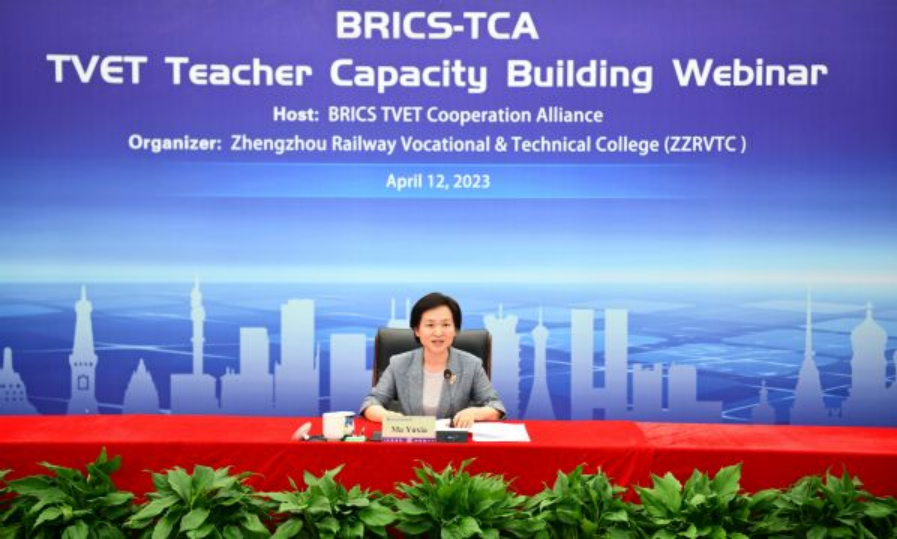On April 12th, the First “TVET Teacher Capacity Building Webinar” in 2023, hosted by the Secretariat of the BRICS TVET Cooperation Alliance and the China Education Association for International Exchange, and organized by ZZRVTC, was held. More than 200 institutional representatives, professional teachers and enterprise leaders from alliance members engaged in an in-depth exchange of views on “course development and talent cultivation in the context of industry-education integration”. The meeting was held in English, and Ma Yuxia, President of ZZRVTC, chaired the meeting in English. The meeting was also attended by Vice President Li Fusheng and relevant department heads.

In his keynote speech, Dr. Niu Ke, from the School of Locomotives and Vehicles at ZZRVTC, detailed the implications, mechanism and main approach for industry-education integration under the title of “Curriculum System Development and Practice in the Context of Industry-Education Integration”. Meanwhile, using the professional railway locomotives group as an example, he presented details on how the professional group develops modules and reconstructs the curriculum system in accordance with realistic corporate needs, thereby effectively enhancing the efficiency of talent training. The aim is to meet the development needs of enterprises while promoting the deep integration of the education and industry chains.
 Alexey Neklyudov, Deputy Director of the Scientific Research Office of the Russian Communications University, shared how Russian colleges work with enterprises in carrying out project-based teaching, forming scientific research teams, optimizing project design in accordance with market demands, and promoting commercialization. According to him, the model is based on realistic corporate needs, which not only improves students’ practical skills and employment competitiveness, but also overcomes the technical difficulties confronting enterprises in gaining market returns.
Alexey Neklyudov, Deputy Director of the Scientific Research Office of the Russian Communications University, shared how Russian colleges work with enterprises in carrying out project-based teaching, forming scientific research teams, optimizing project design in accordance with market demands, and promoting commercialization. According to him, the model is based on realistic corporate needs, which not only improves students’ practical skills and employment competitiveness, but also overcomes the technical difficulties confronting enterprises in gaining market returns.

From the perspective of the localized operation of Chinese enterprises overseas, Song Zhengang, a senior engineer at the China Railway Construction Corporation Transportation Operation Co., Ltd., detailed that since the Addis Ababa-Djibouti railway was put into commercial operation, they had continuously innovated the collaborative industry-education mechanism and cooperated with domestic and foreign colleges in training a great number of employees. They also proposed ideas on the future focus of industry-education integration.

Carlos Henrique Bento, a professor at the Federal Institute of Education, Science and Technology of Minas Gerais, Brazil, introduced the Brazilian professional and technical education network and vocational education system, as well as the challenges and adaptability of developing specialized courses for college-enterprise cooperation.
 After the keynote speeches, the attendees engaged in active interaction in terms of the difficulties arising from the process of cooperative college-enterprise education and how college education should closely follow development trends in technology.
After the keynote speeches, the attendees engaged in active interaction in terms of the difficulties arising from the process of cooperative college-enterprise education and how college education should closely follow development trends in technology.
 The workshop was the first teacher training activity to be held by the BRICS TVET Cooperation Alliance in 2023. All the alliance members took an active part, achieving good results. In the near future, the Alliance will continue to hold more teacher training activities to engage in exchanges and training at various educational levels to promote the high-quality development of vocational education in the BRICS countries.
The workshop was the first teacher training activity to be held by the BRICS TVET Cooperation Alliance in 2023. All the alliance members took an active part, achieving good results. In the near future, the Alliance will continue to hold more teacher training activities to engage in exchanges and training at various educational levels to promote the high-quality development of vocational education in the BRICS countries.

